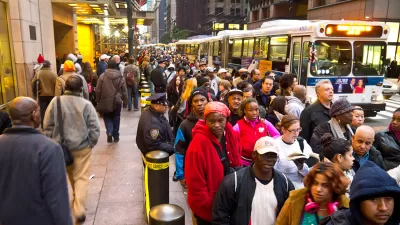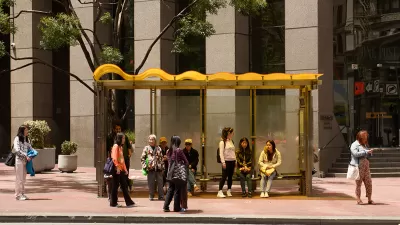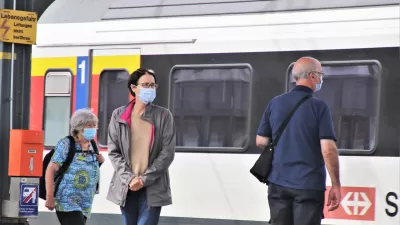Transit agencies are waking up to the inequities in transportation systems—highlighted by the realities of the Covid-19 pandemic.

Although public buses play key roles in the lives of 'essential workers' and low-income residents, many cities allocate "just a small share of overall transit investment" to bus lines, opting instead to fund light rail and other more glamorous projects that don't address the needs of communities of color. As Dan Zukowski writes,
The COVID-19 pandemic exposed long-standing inequities in public transportation networks across the United States. In city after city, suburban trains ran nearly empty while neglected bus systems continued to carry essential workers to their jobs in hospitals, grocery stores, and warehouses. Costly new and expanded rail lines, built over the past two decades, suddenly went unused. The long-standing underinvestment in urban transit only added to racial injustice exacerbated by a pandemic that disproportionately killed Black and Latino people.
For many workers who are "utterly dependent on transit," the pandemic offered no work-from-home options or paid leave. "Buses are the most-used form of public transit, yet from 2010 to 2019, less than 8 percent of the money spent nationally on transportation went to bus lines, according to data compiled by Yonah Freemark, a researcher at the Urban Institute," and "new capital projects have received four times the funding of maintenance and operating expenses over the past decade." Steve Poftak, general manager of the Massachusetts Bay Transportation Authority (MBTA), said at a conference that seeing the change in ridership "really made a tremendous impact on our understanding of how people depend on the transit system."
But agencies around the country are "reassessing their networks, with a priority on investing in better bus systems for more equitable service." From Chicago's new strategic plan, which places a focus on "comprehensive mobility justice," to Los Angeles Metro's Office of Equity and Race, cities are acknowledging the links between transportation and equity. "New York City, Washington, D.C., and Boston are also planning to improve their bus networks, with more frequent service, extended hours, dedicated bus lanes, and routes that better match community needs. While some efforts began before the pandemic, 2020 laid bare the unmet needs of lower income communities and communities of color."
FULL STORY: ‘Mobility Justice’: How cities are rethinking public transportation after COVID

Maui's Vacation Rental Debate Turns Ugly
Verbal attacks, misinformation campaigns and fistfights plague a high-stakes debate to convert thousands of vacation rentals into long-term housing.

Planetizen Federal Action Tracker
A weekly monitor of how Trump’s orders and actions are impacting planners and planning in America.

Chicago’s Ghost Rails
Just beneath the surface of the modern city lie the remnants of its expansive early 20th-century streetcar system.

Bend, Oregon Zoning Reforms Prioritize Small-Scale Housing
The city altered its zoning code to allow multi-family housing and eliminated parking mandates citywide.

Amtrak Cutting Jobs, Funding to High-Speed Rail
The agency plans to cut 10 percent of its workforce and has confirmed it will not fund new high-speed rail projects.

LA Denies Basic Services to Unhoused Residents
The city has repeatedly failed to respond to requests for trash pickup at encampment sites, and eliminated a program that provided mobile showers and toilets.
Urban Design for Planners 1: Software Tools
This six-course series explores essential urban design concepts using open source software and equips planners with the tools they need to participate fully in the urban design process.
Planning for Universal Design
Learn the tools for implementing Universal Design in planning regulations.
planning NEXT
Appalachian Highlands Housing Partners
Mpact (founded as Rail~Volution)
City of Camden Redevelopment Agency
City of Astoria
City of Portland
City of Laramie





























